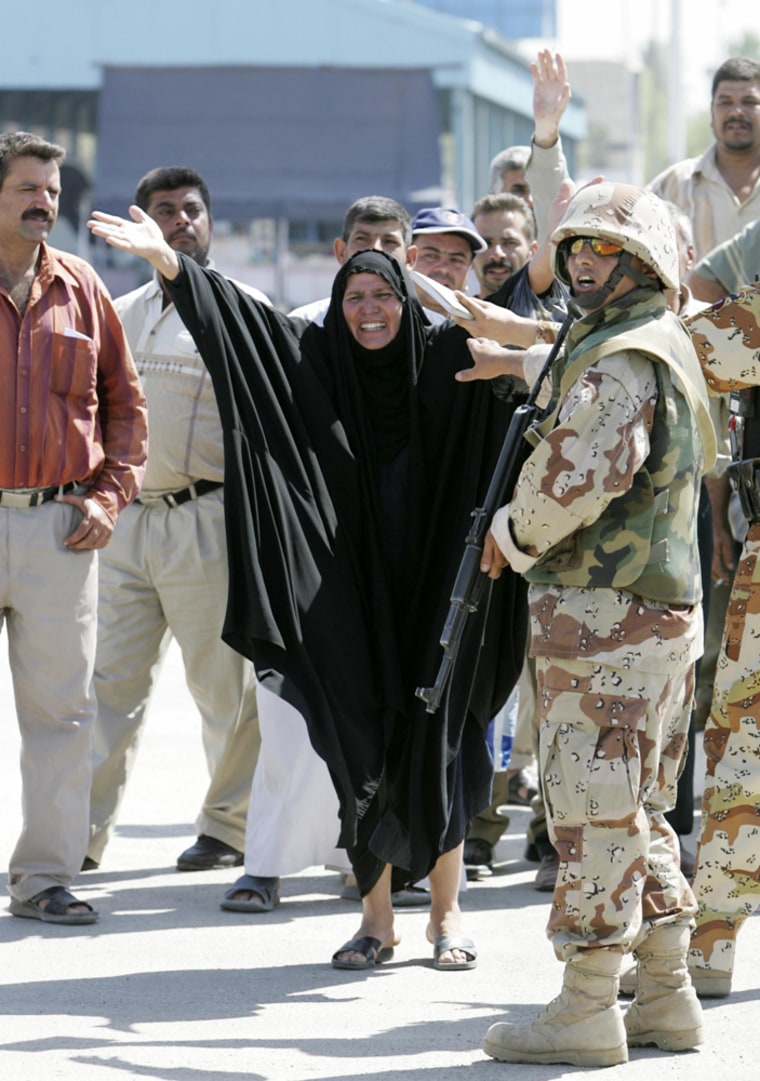Prime Minister Nouri al-Maliki released nearly 600 detainees Wednesday, making good on a pledge intended to ease feuding between Sunni Arabs and Shiites.
The detainees were the first of 2,000 prisoners whom al-Maliki promised would be freed from Iraq’s most notorious prisons in an apparent effort to ease anger among minority Sunnis over allegations of arbitrary detentions and mistreatment of prisoners.
Sectarian tensions surged with Monday’s abductions of 50 people in downtown Baghdad by gunmen wearing police uniforms and the shooting deaths of 21 Shiites north of the capital, including students pulled from their minivans.
Police said Wednesday that 15 of the kidnapped people had been released, some with signs of torture, but provided no details on their identities.
Violence was unabated Wednesday, with at least 14 deaths reported.
Among those were a man and his son, who died in a gunbattle that also wounded eight people, including five women and a baby, just north of Baqouba, according to the Joint Coordination Bureau in Diyala. It was unclear how the fighting began.
Kissing the ground
Al-Maliki, a Shiite who took office two weeks ago, has made security and reconciliation among Sunnis and Shiites a priority of his government. He has stressed, however that the detainee release plan excludes loyalists of ousted leader Saddam Hussein and his Sunni-dominated Baath Party, as well as “terrorists whose hands are stained with the blood of the Iraqi people.”
Italy’s foreign minister, meanwhile, said Italy will not withdraw all its troops from Iraq until the end of the year, sticking to a timeline set by former Premier Silvio Berlusconi even after the election of a new center-left government.
But Foreign Minister Massimo D’Alema, who was in Baghdad to discuss the plans with Iraqi leaders, said Italy would begin reducing the number of Italian troops in Iraq this month.
The Iraqi government said 2,000 detainees whose cases have been reviewed will be released in the coming days in batches of about 500. The first 594 were released Wednesday from U.S.- and Iraqi-run prisons around Iraq, including Abu Ghraib.
Released inmates dropped off at a bus station in Baghdad kissed the ground and sat down and cheered. One man used crutches for support.
“I was arrested from my home on Dec. 19, 2004, so I was accused of kidnapping people working for Iraqna mobile company,” said one released prisoner, Mohammed Jassim.
Al-Maliki said Tuesday 2,500 would be released, but changed that number to 2,000 Wednesday.
'Happiness and hope'
Iraqi officials have said there is an agreement to release up to 14,000 detainees once their cases have been reviewed. A U.N. report last month said there were 28,700 detainees in Iraq.
Omar al-Jubori, a member of the Iraq Islamic Party, the largest Sunni Arab group in the governing coalition, said the agreement came after negotiations with U.S. Embassy and military officials, as well as street protests.
The releases will “give happiness and hope to every detainee and every oppressed person in this country,” al-Jubori said.
The Italian announcement came two days after an attack on an Italian military convoy in southern Iraq killed a soldier and wounded four others. Premier Romano Prodi said Tuesday that the attack would not hasten Italy’s withdrawal from the country.
D’Alema’s announcement was the first indication by the new government of the timing of the complete pullout of Italy’s 2,700 troops from Iraq — the fourth-largest foreign contingent after the United States, Britain and South Korea.
Italy follows Spain, Bulgaria and other U.S. allies that have either withdrawn or reduced their troops in Iraq. Of the 150,000 foreign troops in Iraq, 130,000 are U.S. soldiers.
Shootout and a roadside bomb
Al-Maliki has announced he wants to take over security from U.S.-led forces within 18 months, starting with four southern provinces by the end of the year. The plan would put American and international forces in a supervisory role, part of an exit strategy that will eventually allow the troops to go home.
But it remains doubtful whether al-Maliki’s national unity government will be able to end Iraq’s chaos.
On Wednesday, four police officers were killed in a shootout with gunmen in cars in Baghdad’s upscale al-Mansour district. Five minutes later, a roadside bomb detonated in the same place, injuring a police officer.
In northern Kirkuk, gunmen shot and killed a Sunni Arab cleric and member of the local Association of Muslim Clerics.
Just before dawn, three rockets landed on a house, killing a man and wounding his two brothers in Baghdad. The men had been sleeping on their roof to try to stay cool in temperatures hovering around 116 degrees. It was unclear who the target was.
A roadside bomb killed two police officers and wounded two others near a passport office in eastern Baghdad, police 1st. Lt. Ahmed Muhammad Ali said.
A parked car bomb missed a police patrol in Baghdad’s commercial area of Karradah, killing one pedestrian and injuring four others. A roadside bomb hit an Iraqi army patrol in the northeastern town of Buhriz, killing one soldier and injuring two others.
The bodies of two men, who apparently were tortured and killed execution-style, were found by Iraqi police in western Baghdad.
Al-Maliki has blamed a desire by insurgents to cripple the political process for the spike in violence since he took office just over two weeks ago.
The Iraqi Islamic Party blamed the Shiite-dominated Interior Ministry for Monday’s kidnappings. The ministry, which oversees police, denied its forces were behind the abduction.
Suspicion has fallen on militias, which are believed to have infiltrated police forces and have killed hundreds in sectarian violence, personal vendettas and kidnappings for ransom.
